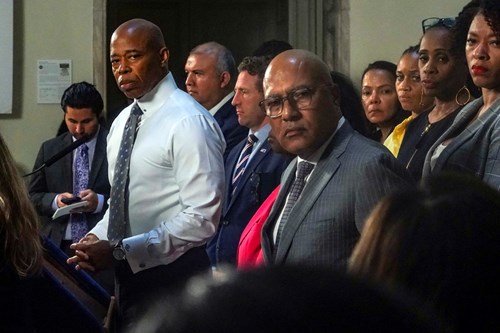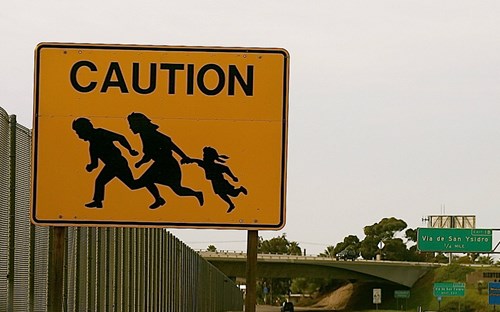Immigration experts put the total number of illegals inside the U.S. at 16-17 million, according to the Family Research Council.
It’s a figure that’s beginning to drain taxpayer-funded resources even in the large urban sanctuaries, such as New York City, where sheltering illegal is costing $20 million a month, according to Fox News.
Mayor Eric Adams has been at the forefront of calling out for help. Last week, he announced his administration is slashing services to illegals by another 10%, CBS New York reported.
 Housing appears to be the biggest cost-saving area.
Housing appears to be the biggest cost-saving area.
"Housing costs are the biggest costs, so the fewer people that you have in hotel rooms and other housing, that is a big part of the costs," spokesperson Sheena Wright told a gathering of reporters. "We're also being more efficient with other services and support. We're saving money on food, security and other services."
Limiting shelter stays to 30 or 60 days had already been in the works.
AFN reported in a January story that a Brooklyn high school, James Madison High, was emptied of students so illegal aliens could be moved in temporarily, which predictably angered parents.
“There are all sorts of services, and I think we can point now to New York City as a prime example of what happens once people get to the United States illegally,” Ira Mehlman, the media director for the Federation for American Immigration Reform, said on Washington Watch Tuesday.
If you can’t find an NYC hotel room, here’s why
Mehlman, in a report for FAIR, said the $12 billion New York has budgeted for care of illegals does not account for the full fiscal impact the city faces. The figure accounts for expenses but not revenues.
Under the city’s “right to shelter” law, some 16,000 hotel rooms were made unavailable for tourists, according to a trade publication.
Savings are welcome but the fight is far from finished in New York City. The new budget will be proposed in the spring and education cuts are possible, CBS reported.

“The city is on the hook for providing housing for everybody who shows up, and any child who is in this country is entitled to a taxpayer-funded K-12 education," Mehlman told show host Tony Perkins. "We are a decent, humanitarian people. We are not going to allow people with medical needs to go untreated. People use basic services, sanitation, all of those things. This costs a lot of money."
Most illegals are not receiving direct welfare payments, though some are, Mehlman said. Their welfare status notwithstanding, supporting illegals with what Americans consider basic services can be overwhelming.
“It doesn’t matter if you’re getting direct welfare benefits, just the societal costs of having you here amount to huge amounts of money,” Mehlman said. “A New York councilwoman noted that the city is now spending more on care for migrants than on police, fire and sanitation combined.”
Impact on U.S. taxpayers exceeds $150 billion
A 2023 study by Mehlman’s FAIR group placed the cost of caring for illegals at $182 billion. Subtract taxes paid by some illegals – much of it in the form of sales tax – and the negative impact on U.S. taxpayers is estimated at almost $151 billion.
Illegal immigration costs each American taxpayer almost $1,000 annually, the report found.
The Biden administration has worked hard to keep illegals in the county once they’re here, Mehlman told AFN in a separate interview.
Secretary of Homeland Security Alejandro Mayorkas recently announced the "extension" and "redesignation" of Syria for Temporary Protected Status or TPS. The Secretary claims TPS is "warranted" due to the ongoing armed conflict and extraordinary and temporary conditions in Syria. The designation is valid for 18 months through September 30, 2025, allowing Syrian nationals even if they are in the country illegally to be protected from removal.
 “Everything that this administration has done," Mehlman says, "has been to find ways to get people into the United States or to remain in the United States without having the bad optics of the border. We've seen massive abuse of parole authority. We have seen repeated issuances of temporary protected status, deferred departure."
“Everything that this administration has done," Mehlman says, "has been to find ways to get people into the United States or to remain in the United States without having the bad optics of the border. We've seen massive abuse of parole authority. We have seen repeated issuances of temporary protected status, deferred departure."
All of those allowances, Mehlman concluded, are designed to "mask" the real consequences of illegal immigration.
Hospitals and schools bear the brunt of the increased number of bodies to serve. Cost increases for hospitals are passed onto insurances companies and then to consumers.
“It’s putting a strain on our healthcare system, and we are paying for it in myriad different ways. In many cases they’ll go to public hospitals which are paid for by the taxpayers. Anybody who has private health insurance knows the price keeps going up year after year. Part of that is driven by the fact that we as insured patients subsidize those who are not insured, and a growing number of those people are in the country illegally,” Mehlman said.
Cash-strapped California paying healthcare for all illegals
While Adams has called for help for his city, some Democrats are doubling down on left-leaning migrant policies regardless of costs.
California in January became the first state to offer health insurance to all illegals regardless of age.
 The move added about 700,000 adults, between the ages of 26 and 49, to the rolls, ABC News reported.
The move added about 700,000 adults, between the ages of 26 and 49, to the rolls, ABC News reported.
An op-ed in The Orange County Register said state-funded health care for illegals was a move that defied “common sense” and one that “should anger every taxpayer.”
The state had previously provided emergency and pregnancy-related care for illegals.
“Under the Affordable Care Act illegal aliens were not eligible for taxpayer subsidized health insurance programs, and that was deliberate. When they negotiated that bill back in 2010 that was a deliberate omission,” Mehlman said. “This is money the state doesn’t have to begin with. No. 2, it is money that could be used for other services that American citizens and legal residents need.”







